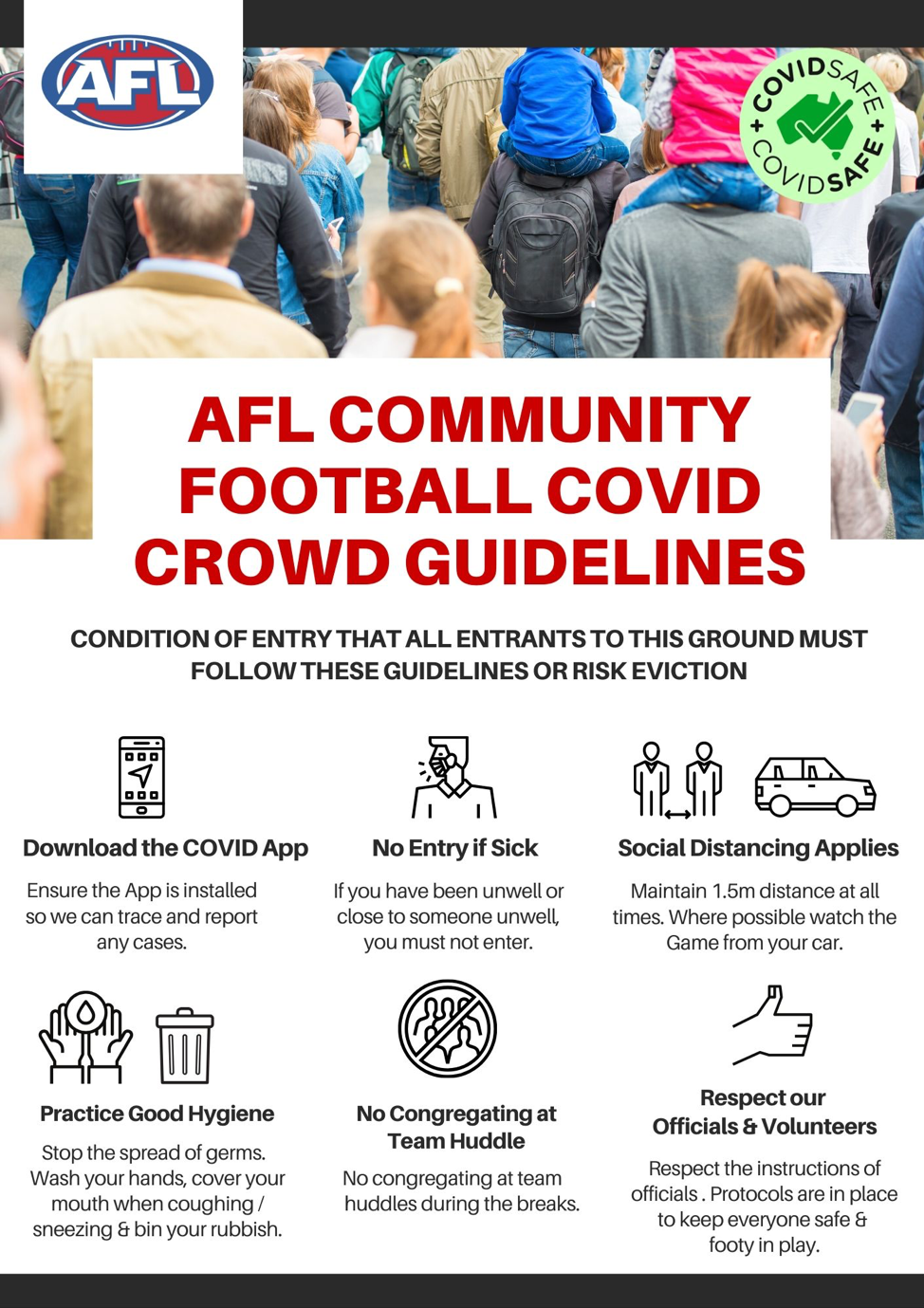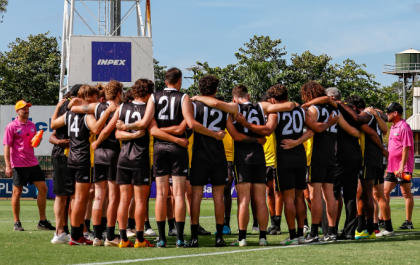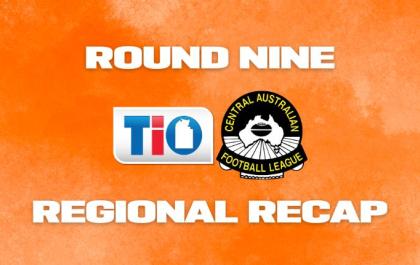
From Alice Springs to Katherine and the 1,182 kilometres in between, we're excited for the return of Territory footy! Things are going to look a little different for everyone when the action starts next week, but we’ve got all the right health and safety protocols to keep our community safe and to ensure that footy stays up and running.
Download this AFLNT Return to Play Protocols as a PDF document here
Return to Play Protocols
AFLNT/Club Hosting Home Game Requirements
- NT Government COVID Safety Plan will be completed for every venue
- All AFLNT & Club Match Managers will complete mandatory COVID‐19 health and safety training
- AFLNT to conduct briefings in advance of Round 1
- Where practical, AFLNT will allow for a small break between matches for cleaning and for people to leave the venue
- AFLNT will ensure footballs are wiped in the quarter-time breaks and between games
- Anyone responsible for a venue must have clear signage and markings displayed in all venues to encourage social distancing
- Anyone responsible for a venue must have sanitising stations provided in key locations
- Anyone responsible for a venue must increase cleaning of that venue
Club/ Umpire Group Requirements
- Each club to nominate a COVID Safety Officer to ensure their club is complying with all protocols
- One Official per team must complete mandatory Returning to Community Football in a COVID-19 environment online course and capture the completion via AFLNT.
- Clubs to conduct briefings with players and officials ahead of Round 1
- Only key club and AFLNT personnel can access change rooms/bench
- Teams are responsible for wiping down change room benches after use of change rooms
Other/General Requirements
- Crowds of up to 500 people are permitted, unless otherwise advised (i.e. Grand Finals) and upon completion of an NT Government over 500 Safety Plan
- Spectators are not permitted to gather around team huddles at breaks
- Everyone must adhere to any relevant NT Government advised travel restrictions
- Everyone is to follow the direction and advice of Police, Local Government and AFLNT at all times
Hygiene Protocols
Everyone
- Do not attend if unwell
- Apply personal hygiene measures – use hand sanitiser before and after attending the venue
- Adhere to social distancing (1.5m between) which will be monitored by officials, security and police
AFLNT/Clubs Hosting Home Games
- Wipe footballs at breaks
- Limit and disperse spectators – no field access
- Minimise the use of communal facilities (toilet or medical use only with strict social distancing)
Clubs/Players/Umpire Groups
- Do not share water bottles or towels
- Massage beds, if required, must only use single-use towels and cleaning treatment following every use
- Mouthguards remain in the mouth
- Showers to be had at home where possible
- No sharing food
- Avoid high-fives / celebratory contact
General Hygiene Practices
- Wash your hands often with soap and water for at least 20 seconds - if soap and water are not available, use an alcohol-based hand sanitiser
- Avoid touching your eyes, nose and mouth
- Avoid close contact with people who are sick
- Stay home and seek medical treatment when you are sick
- Cover your mouth to cough or sneeze
- It is recommended that vulnerable individuals or those aged 70+ years consider their attendance. If attending, strict social distancing applies
Checklists to be completed
Download the checklist for AFLNT/Clubs Hosting Home Games here
Download the checklist for Clubs/Umpire Groups here
Crowd Protocols
- Arrange the venue layout to maintain 1.5 metres between participants & spectators
- Encourage participants and spectators to refrain from crowding together through signage where appropriate
- Manage the entry and exit points of the venue so that participants and spectators are not queuing at these points
- Ensure seating arrangements for spectators allow 1.5 metres between groups and between rows of seats
- Place signage around the premises to remind participants, and employees to maintain hygiene practices and to go home if feeling unwell
- Encourage participants and spectators to remain 1.5 metres apart when moving through the venue
- Encourage staff or spectators to minimise time spent in close contact with a particular focus on minimising face-to-face contact. Face-to-face contact with people not from your group should be 15 minutes or less
Canteen Protocols
- Canteen surfaces to be frequently and adequately cleaned
- Ensure social distancing by placing floor or wall markings or signs to identify 1.5 metres distance between persons for queues and waiting areas
- Set up different areas for ordering and collection, and where practical, separate entry and exit paths
- Consider using physical barriers where practical, such as widening counters or plexiglass around counters involving high volume interactions with customers
- Provide contactless payments or ordering and payment online or through ordering apps where practical
- Instruct all workers to practise good hygiene by frequently cleaning their hands
- Provide hand washing facilities for customers and patrons including clean running water, liquid soap, paper towels. If hand washing facilities are not readily available, provide an appropriate alcohol-based hand sanitiser
- Modify processes behind the counter (including in the kitchen) to limit workers having to be in close contact, as much as possible. For example:
- Assign workers to specific workstations to minimise the need to go into other spaces
- Implement processes so the front of house workers can collect food without needing to go into food preparation areas.
- Educate all workers on protocols
- Put signs and posters up to remind workers and others of the risk of COVID‐19
Vulnerable Cohorts:
Any player or official member that has underlying health conditions or is considered a vulnerable person should consult with a healthcare professional prior to returning to the training or match day environment. Vulnerable cohorts (including those over 70 years of age) should remain 1.5m from all persons other than those with whom they share a household – this distancing requirement may prevent some individuals from undertaking some of the roles they may normally undertake within the club.
Testing of unwell Players/Officials:
- Anyone who has a fever or respiratory symptoms consistent with coronavirus, no matter how mild, is strongly recommended to attend a COVID-19 clinic, or their CP, for assessment and testing
- Monitor for symptoms such as fever, cough or shortness of breath. Other early symptoms to watch for are chills and body aches or muscle pain, a sore throat, headaches, runny nose, diarrhoea or unexplained loss of taste or smell
- If it is determined the player or official is to undertake a test, following the test they must self-isolate by immediately going home and resting while they wait for the test result (which they should usually get within 2 days). Whilst they are waiting, they must stay at home (i.e. Not attend work, school/university or training), wash their hands often with soap and water, cough and sneeze into a clean tissue or their elbow and avoid close contact with others, including members of their household
- The club’s nominated representative (e.g. COVID Safety Officer) must be notified that they have undertaken a COVID-19 test who must then notify an AFLNT official who will advise on next steps
- If they receive a positive test result, they must strictly follow all instructions to self-quarantine
- They will also be contacted by relevant authorities to help contact trace their close contacts
- AFLNT and the club must also follow the advice of authorities with regard to any suspension of training/games
- A player/official member must also not join the training or playing environment if in the last 14 days they have been unwell or had contact with a known or suspected case of COVID-19
Education Protocols
- Any Club Medical Official (doctors, physios, sports trainers) must complete the Australian Government COVID-19 infection control training designed for doctors, nurses and allied health personnel working in a medical/health setting
- All players and official are encouraged to subscribe to the Government’s COVID-19 tracing app.
- Clubs to conduct briefings in advance of return to play for players, coaches and officials to outline these protocols
- Club to nominate a COVID Safety Officer and Club Office holders to lead a strong culture of COVID-19 safety for the health and wellbeing of club members and the broader community
All football clubs play an important role in:
- Reducing the spread of COVID-19;
- Promoting good hygiene practices amongst players and officials;
- Adhering and promoting the NT Government Requirements around social distancing and gatherings; and
- Following the clear protocols and requirements around Return to Play
It is important that clubs are respectful in adhering to the protocols outlined as part of Return to Play, as they form part of the current Government directions, and sanctions can be applied to individuals and to clubs if they are in breach.
Every club and individual playing their part in adhering to the protocols will mean that football would have played its part in the community through a commitment to community health outcomes.
Club and Umpiring group Briefings:
| Participant briefing | Coaches briefing |
|---|---|
|
Prior to round 1, clubs and the umpiring group are to provide a briefing to all participants, coaches, volunteers, parents that includes:
|
Clubs should also brief all coaches on the required expectations as leaders within the club environment, including:
|



